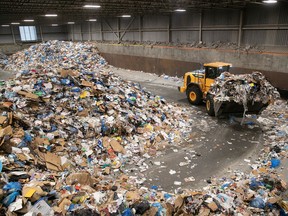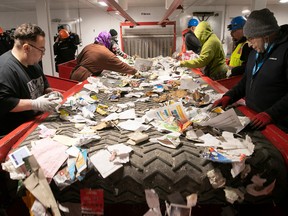The material that arrives at the facility is already 82 per cent recyclable, says Société VIA's president. There are some strange items amid the other 18 per cent: propane tanks, car batteries, tires.

It’s 10 a.m. and near bay doors where recycling trucks have been dropping off their cargo, there is a massive pile of waste that nearly reaches the ceiling.
Cardboard boxes, transparent blue plastic bags and cereal boxes are seen at the top of the heap.
Sign up to receive daily headline news from the Montreal Gazette, a division of Postmedia Network Inc.
Thanks for signing up!
A welcome email is on its way. If you don't see it, please check your junk folder.
The next issue of Montreal Gazette Headline News will soon be in your inbox.
This mountain of garbage consists of the recycling picked up across the island of Montreal in just one day. The Lachine sorting centre has 80 workers, putting in two eight-hour shifts per day to sort and weed through the recycling collected in roughly 58 per cent of the island’s households. It’s one of two centres on the island, handling waste in the western portion of the city; the rest is sent to the St-Michel Environmental Complex.
While the average Montrealer could lose faith seeing a mountain that weighs between 600 and 1,000 tonnes every day, Société VIA president and director general Jean-Sébastien Daigle sees optimism.
“Montrealers are actually pretty good at sorting their recycling,” Daigle told reporters who visited the facility Thursday.
Société VIA, which was awarded the contract to sort the city’s curb recycling contents in October, is a non-profit company whose aim is to employ those with what the company calls functional limitations — who would otherwise have a difficult time finding a suitable job. It took over from Ricova, whose contract was terminated after the company told the city it would have to shut down the Lachine site because it was unable to turn a profit, as final products were highly contaminated with bits of refuse plastic. Ricova hadn’t been there for long: it took over from RSC Group after the multinational ceased its Canadian operations at the beginning of 2020.
The sorting centre was built in 2019 and is owned by the city. It is considered to be a state-of-the-art facility. Société VIA maintains the machines, hires the employees and reaps the profit from what is sold to outside industries.
Daigle said thanks in part to good recycling habits, the material that arrives at the facility is already 82 per cent recyclable. Of the 18 per cent that isn’t, some strange items can be seen: propane tanks, banana peels, car batteries, tires. On Thursday an immersion blender was among the items that employees fished out and placed in metal bins, to be sorted later and ultimately sent to a landfill.
Sorting machines use air to blow away lighter paper products, allowing them to float to the top and be found more easily. Cameras and mechanical sorters are used to sort through 10 products per second.

While other companies running this facility had trouble finding people to buy Montreal’s waste, VIA has been able to boost the purity of plastic, metal, glass and even cardboard and paper products to the point that they can all be resold to secondary markets. The chief factor in this has been the fourfold boost in the company’s labour force, from 10 to 40.
The purity of plastic, metal, glass and cardboard is close to 100 per cent. They are sorted into bundles tied with rope at the far end of the facility.
Mixed paper products remain the biggest challenge, with a contamination rate of just under 10 per cent. Roughly 20 per cent of these products are resold to paper giant Cascades, to be recycled locally. The rest is sold to companies in India and other Asian countries to be recycled there; VIA had few details about the kinds of companies that bought the products in Asia.
The horror stories of paper being burned in major dumps in China are not the reality for Montreal’s recycling collection, Daigle said.
Before VIA took over, contamination rates were hovering close to 30 per cent, said Arnaud Budka, director of residual material for the city.
Daigle said his goal is to bring the purity of mixed paper to 95 per cent so more of it can be sold locally. The easiest way to boost that percentage is for Montrealers to do a better job of sorting their trash.
“It should be illegal to put lithium batteries in the recycling, because they can catch fire instantly,” Daigle said. “The work of the people here is very difficult, so in respect to them, that would be a good thing.
“Plastic wrap is another issue. Despite the fact that we accept it, it’s difficult to sort. If you put all the plastic together, or make bags of plastic bags, that would help a lot.”
Daigle said during the 10-year contract the company has with the city, it would like to expand the facility — not just to handle more residual material, but to give employees pleasant places to take their breaks. He said his company plans to live out the length of the contract, and that despite being a non-profit, it is able to make money by handling what Montrealers throw away.
“If it weren’t profitable, we wouldn’t be doing this,” he said.
jmagder@postmedia.com
twitter.com/jasonmagder
-

Automated recycling centre opens in Lachine, but glass remains an issue
-

Montreal to sever contract with company managing Lachine recycling centre


